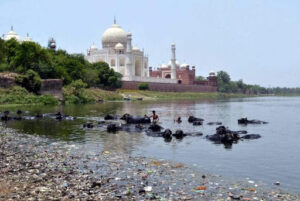Resetting Climate Changes
As we all know that one of the major issues for us from an exceptionally long time is climate change and its consequences. It is still an exceedingly difficult situation for us modern day humans as we have already polluted our environment so much that it would take thousands of years for nature to get normal. Even though we Indians give respect and pray to our holy rivers Ganga and Yamuna we still pollute them by throwing waste, washing clothes and by disposing industrial waste there.

Even after knowing about all this mess people still don’t obey the sanitary laws and pollute the water bodies as well as the place where they reside. The efforts of the government also goes waste as people don’t tend to understand and even try to litter the heritage sites and their premises.
Even if we stop polluting the resources the already existing pollutants will take thousands of years to decompose.

But, whatsoever it may take if we truly make our minds to not pollute the resources then we would be successful even though it may take time.
Government of India has launched eight Missions as part of the National Action Plan on Climate Change (NAPCC) in specific areas which include assessment of the impact of climate change and actions needed to address climate change.
- National Solar Mission:
- The NAPCC aims to promote the development and use of solar energy for power generation and other uses with the ultimate objective of making solar competitive with fossil-based energy options.
- The plan includes: specific goals for increasing use of solar thermal technologies in urban areas, industry, and commercial establishments; a goal of increasing production of photovoltaic to 1000 MW/year; and a goal of deploying at least 1000 MW of solar thermal power generation.
- Other objectives include the establishment of a solar research centre, increased international collaboration on technology development, strengthening of domestic manufacturing capacity, and increased government funding and international support.
- National Mission for Enhanced Energy Efficiency:
- Initiatives based on increasing the energy use efficiency were expected to yield savings of 10,000 MW by 2012.
- Building on the Energy Conservation Act 2001, the plan recommends:
Mandating specific energy consumption decreases in large energy-consuming industries, with a system for companies to trade energy-savings certificates; Energy incentives, including reduced taxes on energy-efficient appliances; and Financing for public-private partnerships to reduce energy consumption through demand-side management programs in the municipal, buildings and agricultural sectors.
- National Mission on Sustainable Habitat:
- To promote energy efficiency as a core component of urban planning, the plan calls for:
Extending the existing Energy Conservation Building Code; A greater emphasis on urban waste management and recycling, including power production from waste; Strengthening the enforcement of automotive fuel economy standards and using pricing measures to encourage the purchase of efficient vehicles; and Incentives for the use of public transportation.
- National Water Mission
With water scarcity projected to worsen as a result of climate change, the plan sets a goal of a 20% improvement in water use efficiency through pricing and other measures.
- National Mission for Sustaining the Himalayan Ecosystem
The plan aims to conserve biodiversity, forest cover, and other ecological values in the Himalayan region, where glaciers that are a major source of India’s water supply are projected to recede as a result of global warming.
- National Mission for a “Green India”
Goals include the afforestation of 6 million hectares of degraded forest lands and expanding forest cover from 23% to 33% of India’s territory.
- National Mission for Sustainable Agriculture
The plan aims to support climate adaptation in agriculture through the development of climate-resilient crops, expansion of weather insurance mechanisms, and agricultural practices.
- National Mission on Strategic Knowledge for Climate Change
To gain a better understanding of climate science, impacts and challenges, the plan envisions a new Climate Science Research Fund, improved climate modelling, and increased international collaboration.
It also encourages private sector initiatives to develop adaptation and mitigation technologies through
venture capital funds.
By – ANSH BARMAN

